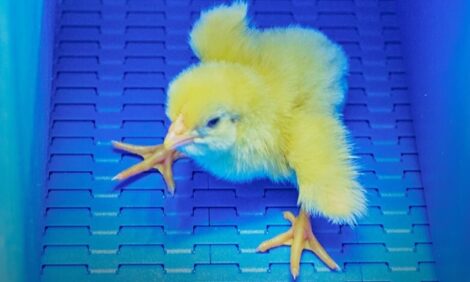



Research reveals new avian influenza vaccine from Pirbright induces faster, stronger response
Pirbright scientists recently developed a potential bird flu vaccine that offers better AI protectionThis vaccine was easier and less costly to produce than traditional flu vaccines.
Researchers at the Institute have now discovered even more benefits from this vaccine which potentially protects birds from the H9N2 strain of avian flu as soon as they hatch.
The new vaccine was able to induce a faster and stronger immune response in vaccinated chickens due to its specialised design, known as a ‘targeted antigen delivery vaccine’. It works by taking antigens (the parts of the virus that activate the immune system) directly to a set of cells in the immune system that are responsible for processing and displaying antigens on their cell surface. The display of virus antigens triggers other immune cells to recognise the virus and remove it, creating a protective immune response to stop birds getting and spreading flu.
When chicks are born, they have immunity passed on to them via their mothers. However, this immunity can decrease the effectiveness of vaccines, meaning that chicks are more susceptible to disease. In the most recent study published in npj Vaccines, researchers discovered that this novel vaccine could avoid interference from those maternal antibodies that protect the chick in the first few weeks of life. This is important as chicks are usually vaccinated against flu one day after hatching, when maternal antibodies are at their highest level.
The study compared three different types of vaccines on interference from maternal antibodies: the targeted antigen delivery vaccine, an untargeted vaccine and an inactivated H9N2 vaccine (the standard vaccine used in poultry). Data showed that the targeted antigen delivery vaccine not only resulted in the highest levels of antibodies against H9N2 flu virus, but that it was the only vaccine that gave long lasting protection against flu and was not affected by maternal antibodies. A targeted antigen delivery vaccine is therefore a crucial step to reduce the devastating effects that avian influenza has on poultry health and food security.
Professor Munir Iqbal, Head of Pirbright’s Avian Influenza Virus group, said: “This research highlights the importance of improving vaccine development which will reduce disease and improve animal welfare. Targeted antigen delivery vaccines have the potential to be the next generation of poultry vaccines as they generate powerful immune responses which protect chickens and reduce the risk of avian influenza spreading to humans. Furthermore, overcoming maternal antibody interference is important for disease control and will ensure that all chickens are protected once they hatch. Further studies will focus on testing the effectiveness of this vaccine in the field to ensure it can be applied to real life poultry production.”








